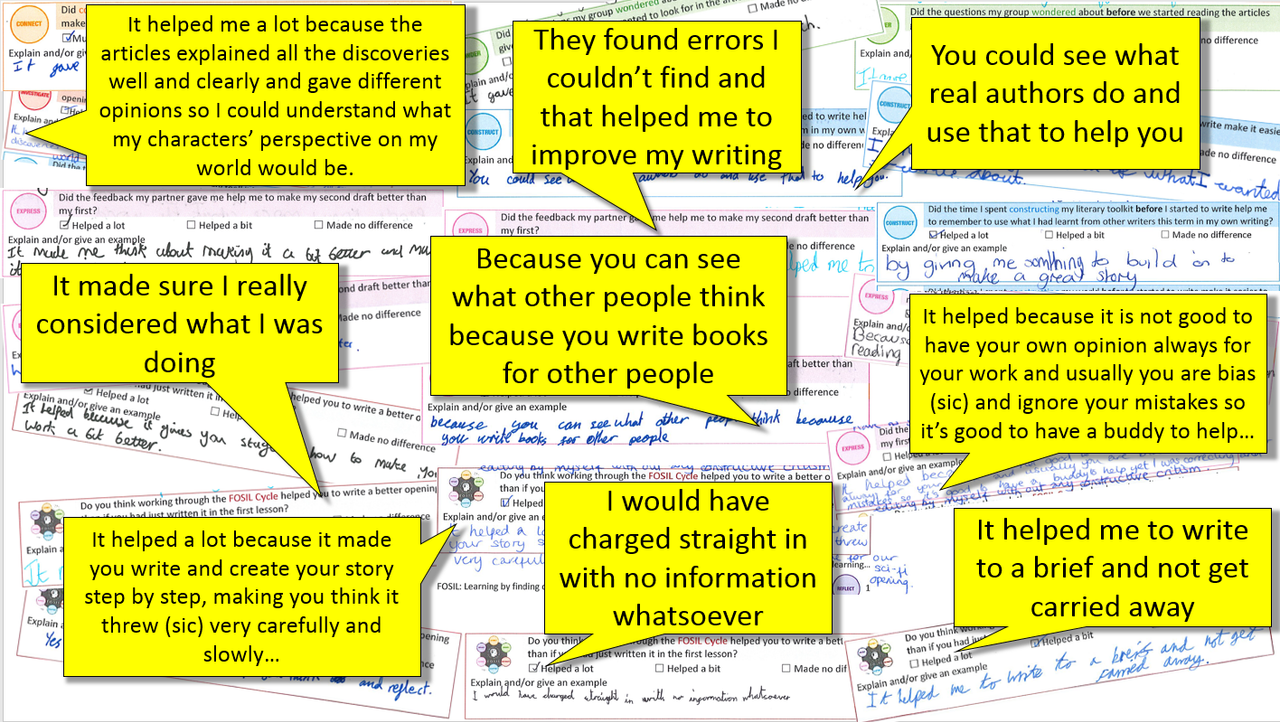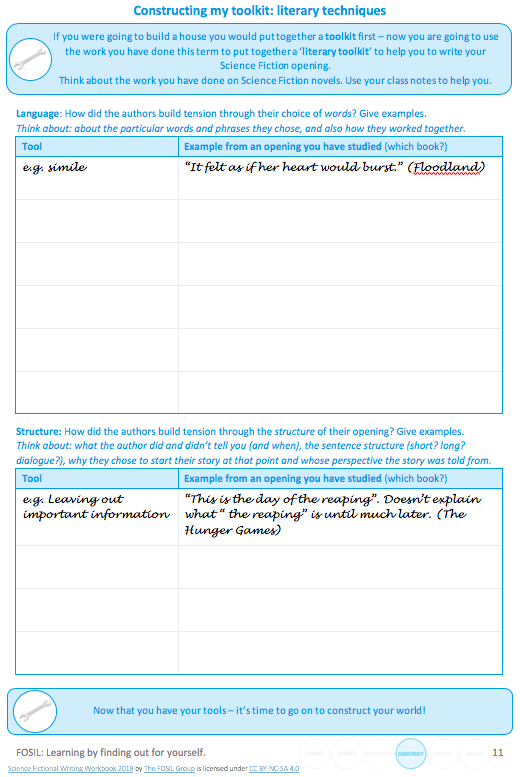Year 7 English Inquiry – Science Fictional Writing
Home › Forums › Inquiry and resource design › Year 7 English Inquiry – Science Fictional Writing
- This topic has 4 replies, 2 voices, and was last updated 5 years, 6 months ago by
 Jenny Toerien.
Jenny Toerien.
-
AuthorPosts
-
15th April 2019 at 10:11 am #863
In April 2018 the announcement was made to staff that the IB Middle Years Programme was to be introduced at Oakham with the first wave of departments planning units to be delivered to Year 7 in September 2018. English was to be part of this first wave and they planned to teach a unit which had previously included an inquiry into science fictional futures. We were therefore keen to be involved. Resources had been developed the year before to assist pupils with this inquiry, so we did have a foundation on which to build, but there was also a year’s worth of experience of FOSIL-based inquiries to add into the mix.
At an initial meeting (07 May 2018 – good use of a bank holiday!) with the Head of English, we discussed what had been done previously and how that could be adapted to fit the new unit. Very little then happened until the MYP unit planning session began in earnest.
MYP unit planning officially began on 05 Jun 2018 and we were involved in planning from the outset as it was important to know where the inquiry was leading on from, and how the end task – which we would be responsible for leading up to – needed to reflect the earlier work.
Adaptations from the original inquiry included:
- Focus being placed on creating a dystopian opening to a novel rather than a purely science fictional one – as the basis of initial work was to be on climate change, as the context, and dystopian novels as a genre;
- Limiting outcome from a choice of three tasks to all pupils being asked to produce the same creative piece of work as the assessed work for the end of the unit – this had been identified at the end of the previous year’s inquiry as something that needed reconsidering.
20th April 2019 at 10:05 am #1036Unit introduced to those who would be teaching it – many of whom had already contributed to the planning stage, but not all – which led to modifications in the overall plan for the shape of the unit, although the inquiry was not greatly debated at this stage.
It was not until November 2018 when we were updated on how the unit was progressing that plans for the inquiry and the development of resources began in earnest. Delivery began on 19 and 20 Nov 2018 but at the outset only resources for the initial stages of the FOSIL cycle had been created/updated. Many other were created/adapted as the inquiry progressed to meet emerging needs – both in terms of helping students through the process and to meet the assessment criteria of the MYP which was a new consideration. For example, about half way through the inquiry, we realised that different working documents would be needed in order to show the development and redrafting stages of the writing. Therefore a contents page was developed to allow pupils to gather together and present the necessary documents for assessment.
9th May 2019 at 8:26 pm #1283This was an exciting inquiry to be involved in because it ran for a substantial period of time – eight 50 minute lessons spread over 2 weeks, for five different groups – and because we were heavily involved in team teaching, with the English teachers taking the lead in some lessons and the library staff in others. As Lucy mentioned, the resources evolved during the inquiry which allowed us to be much more responsive to students’ and teachers’ needs than if we had produced a booklet in advance. It increased the pressure though! Substantial reflection was built into the inquiry which, while being a very valuable exercise for the students, also gave us excellent, instant feedback on the students’ experiences. Students and staff were very positive about the inquiry, feeling that the structure had helped the students to slow down and use what they had learnt in their English lessons over the first half term in their own creative writing. The peer-review and redrafting process was also seen as very valuable for most, with comments such as “[b]ecause you can see what other people think because you write books for other people“. A summary of some of the most interesting comments (produced as part of a TeachMeet presentation on inquiry learning) is shown below.

The final set of resources for this inquiry have been put together into a workbook, which can be found here.
18th June 2020 at 4:36 pm #4502Changes to the workbook for the 2019 iteration
I have been meaning to update this topic for some time, since we ran this inquiry for the second time in November/December this year. The advantage of running the same inquiry several years in a row (as we’ve also found with the Pressure Groups inquiry) is that it gets better each time. We kept the basic idea and structure the same but made some refinements to the inquiry journal workbook this year, and have further changes we want to make next year.
Both copies of the inquiry journal can be found here.
The main changes we made were:
- Last year it was a ‘work in progress’ and new resources were being developed and refined throughout the 8 lessons, so when they got to the end students had to collate everything they had produced into a workbook. This wasn’t ideal and some students found they had lost some of the sheets by the end. This year we produced an A3 centre-folded workbook for each student at the start.
- We updated the articles (not a big change – but important to do every year)
- We added a page of basic IT instructions at the start of the Express section to help students who missed a lesson (or just the start, when the crucial instructions were given) and any who were confused and wanted written instructions to refer to.
- The booklet had a blank space for them to stick each of their first and second drafts, which signposted from the very beginning that they needed to keep both.
- The English Department asked us to change the Redrafting peer review page so that it matched the Constructing my toolkit page (see below). In the first year the Redrafting page had been designed to reflect what the lead English teacher expected her class to end up with in their toolkits (to save them having to rewrite this), but we all realised when we reached this lesson that different teachers wanted the freedom to teach and emphasise different tools and techniques, so it was better to leave this loose (see below for comparison).

 18th June 2020 at 4:36 pm #4503
18th June 2020 at 4:36 pm #4503Lessons we brought to the teaching of the December 2019 iteration
Although it was the second run through for us and for the lead English teacher, at least two of the English teachers had not taught this unit before (because they did not have Year 7 groups last year) so the Librarians (one of whom was present in almost every lesson) brought experience and continuity from last year.
One important lesson we brought from last year was the need to push students to be thinking about the stories they might write as they read the news articles, and filling in the construct sides of their investigative journals. We emphasised that it was much more important to engage properly with one or two articles than to take brief notes on a wide range without keeping the focus on the task.
The second lesson was that we realised that a significant minority of pupils did not use anything from their investigation in their final product (and that these were the ones who were most likely to say that they hadn’t got anything out of the inquiry). We decided that this should form part of the self and peer review stage before redrafting and asked them to highlight anything that had been inspired directly by the articles they had read before they passed it over to someone else for peer review. The other student would then sometimes encourage them to go back to their notes as part of their redrafting. This proved to be an enlightening exercise for some, and helped them to make the connection between the reading they had done and the story they had written, instead of regarding these as two unconnected pieces of work.
Teachers were keen to spend extra time on the creative writing aspect this year and many added at least one extra lesson to the end of the inquiry so that pupils could spend two lessons not one on the second draft. It was encouraging that both teachers and pupils were enthusiastic about ‘finishing well’ and, in the last week of the busy Christmas term, were keen to take a little extra time to produce something pupils could be really proud of. I will post again with some of the student feedback and our thoughts about improvements we want to make next year.
-
AuthorPosts
- You must be logged in to reply to this topic.


